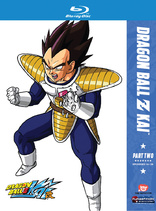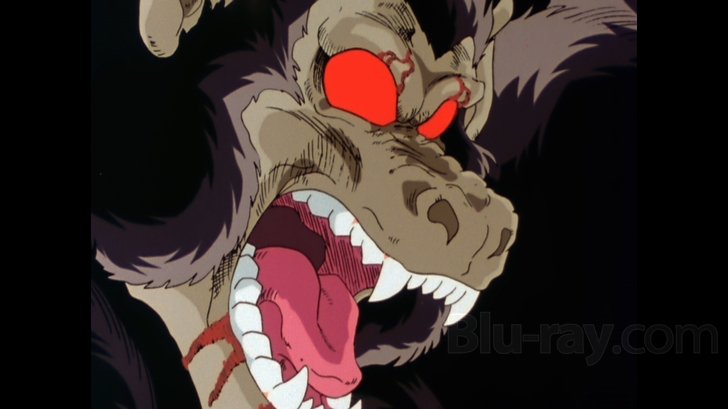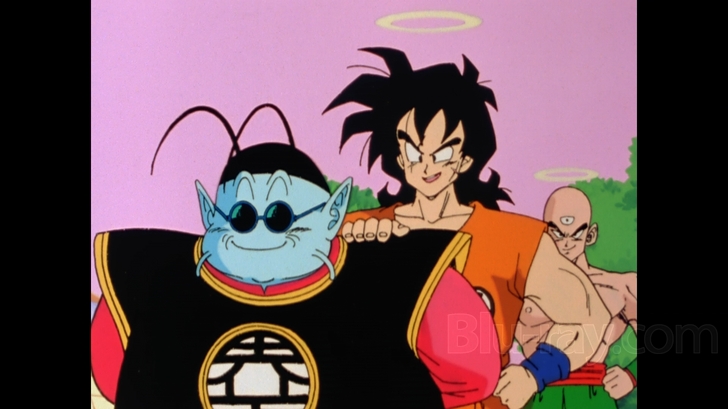Dragon Ball Z Kai: Part 2 Blu-ray Movie
HomeDragon Ball Z Kai: Part 2 Blu-ray Movie 
FUNimation Entertainment | 2009 | 325 min | Rated TV-PG | Sep 14, 2010
Movie rating
8.1 | / 10 |
Blu-ray rating
| Users | 4.0 | |
| Reviewer | 3.0 | |
| Overall | 3.2 |
Overview
Dragon Ball Z Kai: Part 2 (2009)
Goku lies battered and nearly beaten, the Dragon Balls have been destroyed, and a new breed of evil looms on the horizon! Frieza, a violent galactic overlord, has discovered the source of the original Dragon Balls, and he’ll eagerly destroy anything to harness their wish-granting power. Meanwhile, Vegeta – fully recovered from his humiliating defeat – travels to planet Namek on a mission to intercept Frieza and seize the Dragon Balls for own devious desires. With Goku out of commission, courageous young Gohan must journey to the far reaches of space to defeat a foe far more fearsome than anything his father ever encountered. The future depends on it.
Starring: Masako Nozawa, Ryō Horikawa, Toshio Furukawa, Mayumi Tanaka, Hiromi TsuruNarrator: Jôji Yanami, Doc Morgan
Director: Yasuhiro Nowatari, Togo Shoji, Osamu Kasai, Daisuke Nishio, Kazuhisa Takenouchi
| Anime | Uncertain |
| Foreign | Uncertain |
| Action | Uncertain |
| Fantasy | Uncertain |
| Sci-Fi | Uncertain |
| Comic book | Uncertain |
| Adventure | Uncertain |
| Martial arts | Uncertain |
Specifications
Video
Video codec: MPEG-4 AVC
Video resolution: 1080p
Aspect ratio: 1.33:1
Original aspect ratio: 1.78:1, 1.33:1
Audio
English: Dolby TrueHD 5.1
Japanese: Dolby TrueHD 2.0
Subtitles
English
Discs
50GB Blu-ray Disc
Two-disc set (2 BDs)
Packaging
Slipcover in original pressing
Playback
Region A, B (locked)
Review
Rating summary
| Movie | 3.5 | |
| Video | 3.5 | |
| Audio | 3.0 | |
| Extras | 1.0 | |
| Overall | 3.0 |
Dragon Ball Z Kai: Part 2 Blu-ray Movie Review
Volume Two delivers a heaping dose of condensed nostalgia.
Reviewed by Dustin Somner November 6, 2010Despite the prominence of the Dragon Ball franchise among Japanese anime enthusiasts since its inception in 1984, the series received little exposure on western shores during the 80’s and early 90’s. However, as the new millennium approached, television entertainment focusing on younger viewers began undergoing a profound transition in the wake of the Pokemon craze, leaving the door wide open for the proliferation of anime entertainment in the Saturday morning cartoon block. Plenty of card-trading clones emerged to anxiously gobble up a piece of the pie, but other production studios recognized the potential for success in anime series that fit a different taste. With this in mind, the aging Dragon Ball franchise was introduced to America’s youth, offering a violent-but-campy storyline, and all manner of outlandish characters. Unfortunately, the first series never gained much traction with the young viewing audience and was soon replaced by the action-heavy Dragon Ball Z incarnation. When the second series met the same fate during its trial run, Funimation made the wise decision to rethink the target market of the series, and re-release it during the adult-oriented Toonami slot on Cartoon Network. As a result of that move, Dragon Ball Z became a breakaway success on television and home video, earning its designation at the top of the most recognizable anime series in history.

Sayians are a force to be reckoned with when exposed to the glow of a moon.
Dragon Ball Z Kai (Kai translates to “revised”) is a project that’s been undertaken by Toei Animation Studio to celebrate the 20th Anniversary of the show’s initial broadcast. It offers a condensed 100-episode version of the original 291-episode story arch, with any resulting plot-holes addressed in brief narrative segments. Aside from the shortened runtime, the new series also includes remastered high-definition video and sound, with a completely new recording by the original voice cast. Unlike other remasters before it, this is not merely a clean-up project to remove dirt and grime - it’s also a complete reevaluation of source elements with entire segments discarded and replaced (if deemed overly-compromised for high-definition viewing).
The second volume on the release slate contains episodes 14 through 26, picking up just as the battle is heating up between Goku and Vegeta. If you recall from Episode 12, Goku arrived on Earth just in time to save Gohan and Krillin from a sure death at the hands of Nappa. Realizing his evil counterpart is no match for Goku, Vegeta enters the fray for a one-on-one showdown between the two highly-skilled Sayians. What follows is fairly typical of a Dragon Ball showdown, with multiple characters (in this case Krillin and Gohan) jumping into the fight, and both sides using increasingly deadly attacks. Fortunately, the action doesn’t drag on in vintage Dragon Ball Z fashion, cramming events from six episodes of the original series into a mere three on this iteration. Once the epic battle ends, the series moves gracefully into a new story arch involving the discovery of seven dragon balls on Planet Namek. Hoping to resurrect their friends lost in the prior battle (using the wish granted by the discovery of new dragon balls), Krillin, Gohan and Bulma make the distant journey to Namek, but find a new group of formidable enemies led by Frieza. However, before they have a chance to confront this new force, Vegeta arrives with plans of his own, joining the inevitable game of tug-of-war that’s set to ensue.
Mirroring my reaction to the first volume of the series, this new collection strikes an effective balance between the drawn out battles that dominated the original series and a desire for greater focus on the storylines that tie these action sequences together. For instance, despite a lengthy showdown to kick off this volume, we eventually find out a great deal about Kami’s history, discover the tragic circumstances that led to the destruction of Vegeta’s home planet, and move from the familiar atmosphere of Earth to a newly introduced planet. In this manner, the series avoids the slow pacing Dragon Ball Z is known for, moving in a more deliberate, straightforward manner.
Sadly, one of the weaknesses always present in Dragon Ball Z is the lack of true suspense, which holds true on the consolidated version as well. As most fans know, any death in the Dragon Ball Z world simply leads to a spell in a purgatory-like alternate land, allowing a deceased fighter ample time for additional training. In a way, it makes you wonder why everyone doesn’t opt for multiple death-induced training sessions with King Kai, considering how powerful they can become in a relatively short timeframe. Further lowering the suspense factor, Dragon Ball Z suffers from a reliance on the continual evolution of character attributes, forcing viewers to question whether there’s truly such a thing as a finishing move. I suppose a character death is the only way to gauge the effectiveness of an attack, but given the infrequency of such an occurrence and the previously mentioned resurrection factor, it’s difficult to call this edge-of-your-seat entertainment.
Dragon Ball Z Kai: Part 2 Blu-ray Movie, Video Quality 

Presented in 1080p utilizing the AVC codec (at an average bitrate of 26Mbps), Dragon Ball Z Kai looks as good as I anticipated in the transition to Blu-ray. As mentioned earlier in the review, this isn't simply a remastered version of the series (as offered on prior DVD editions), it's a full-blown frame by frame digital clean-up, with newly created animation replacing entire segments. Identifying these new scenes is easy given the subtle stylistic differences (mainly in shadowing and the consistency of lines), but they blend well enough to avoid causing any major distractions. Aside from the new animation, the major difference in this newly-minted version is a complete lack of print flaws found in the original elements. Gone are the large burn-marks, dust blobs, and nicks that we've grown accustomed to finding throughout most episodes. In their place, we're given a clean image that accurately reflects the core intentions of the simplistic animation, but doesn't artificially enhance aspects of the hand-drawn style. You'll still notice byproducts of limitations in the source material, such as line breaks, slight image shift (from one frame to another), and a marginal level of detail, but considering the age and budget of the series, this is likely the best it will ever look.
Dragon Ball Z Kai: Part 2 Blu-ray Movie, Audio Quality 

To accompany the upgraded visuals, the Japanese and English audio tracks have been reworked from the ground up to include newly recorded voice-work from the original voice-actors. The Japanese version offered on the disc is a lossless 2.0 mix, which presents a clean, full sound despite the lack of true surround separation. On the English side, we're treated to a lossless 5.1 mix, which quickly earned its designation as my track of choice. I usually prefer the Japanese language track on other anime series, but given my extensive introduction to the dubbed version of Dragon Ball Z on Cartoon Network, I can easily associate the English cast with the characters in the show. Switching back and forth between the two tracks, it's clear the English offering incorporates a greater sense of immersion, separating sound effects across the surround stage to accompany the onscreen action. However, the differences in volume balance, clarity, and overall richness are negligible, allowing fans of either track ample reason to rejoice.
Dragon Ball Z Kai: Part 2 Blu-ray Movie, Special Features and Extras 

Unfortunately, as with the first volume of the series, the supplemental package is rather light, consisting of textless opening/closing songs, and a collection of trailers for other FUNimation titles.
Dragon Ball Z Kai: Part 2 Blu-ray Movie, Overall Score and Recommendation 

Volume two of Dragon Ball Z Kai doesn't diverge far from the traditional Dragon Ball Z formula, but it continues with a stronger presentation than the original bloated series. For those who've sampled the previous incarnation and found it difficult to wade through, I'd recommend at least a cautious second chance to let the nostalgic charm rope you in. There will always be folks that downright hate the show regardless of how it's edited and reshuffled, but I'd wager longtime fans and open-minded newcomers will be pleasantly surprised with the effort put into the Kai series.
Other editions
Dragon Ball Z Kai: Other Seasons

Dragon Ball Z Kai: Part 1
2009

Dragon Ball Z Kai: Part 3
2009-2010

Dragon Ball Z Kai: Part 4
2010

Dragon Ball Z Kai: Part 5
2010

Dragon Ball Z Kai: Part 6
2010

Dragon Ball Z Kai: Part 7
2010-2011

Dragon Ball Z Kai: Part 8
2011

Dragon Ball Z Kai - The Final Chapters: Part 1
2014

Dragon Ball Z Kai - The Final Chapters: Part 2
2014-2015

Dragon Ball Z Kai - The Final Chapters: Part 3
2015
Similar titles
Similar titles you might also like

Dragon Ball Z: Bardock - The Father of Goku
1990

Dragon Ball Z: Resurrection 'F'
2015

Dragon Ball Z: The History of Trunks
1993

Dragon Ball Z The Movie 8: Broly - The Legendary Super Saiyan
1993

Dragon Ball Z The Movie 3: The Tree of Might
1990

Dragon Ball Z: Battle of Gods
Extended Edition
2013

Dragon Ball Z The Movie 13: Wrath of the Dragon
1995

Dragon Ball Z The Movie 7: Super Android 13
1992

Dragon Ball GT
1996-1997

Dragon Ball Z: Seasons 1-9 Collection
1989-1996

Dragon Ball Z The Movie 9: Bojack Unbound
1993

Dragon Ball Super: Complete Series
Limited Edition
2015-2018

Dragon Ball Z The Movie 10: Broly - Second Coming
1994

Fullmetal Alchemist Brotherhood: Box Set 2
鋼の錬金術師 FULLMETAL ALCHEMIST
2009-2010

Dragon Ball Z The Movie 11: Bio-Broly
1994

Dragon Ball Z The Movie 2: The World's Strongest
1990

Dragon Ball Z The Movie 5: Cooler's Revenge
1991

Dragon Ball Z The Movie 6: The Return of Cooler
1992

Dragon Ball Z The Movie 4: Lord Slug
1991

Dragon Ball Z The Movie 12: Fusion Reborn
1995